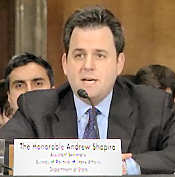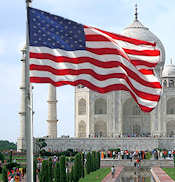
ABOVE: Andrew Shapiro testifying
today before Senate Foreign
Relations Committee
The Senate Foreign Relations Committee today held a hearing on the Defense Trade Cooperation Treaties between the United States and the United Kingdom and between the United States and Australia. Both treaties, the text of which can be found here, would permit certain defense items to be exported without a license from the United States to certain users in the United Kingdom and Australia. Signed in June and September 2007, the two treaties have since languished in the Senate approval process.
Senator Kerry, the Chairman of the committee, indicated in his opening statement his intent to draft and pass a resolution of advice and consent to the ratification of both treaties, although no time frame was given. Senator Lugar, the Ranking Member, used his opening statement to whine about the Implementing Arrangements for the treaty which, he said, weren’t subject to the advice and consent of the Senate and could be changed at any time by the White House and its counterparts in the United Kingdom and Australia. So much for our special relationship with those countries. Whether Lugar’s vote will ultimately be needed for an advice and consent resolution remains to be seen.
Andrew J. Shapiro, Assistant Secretary for Political-Military Affairs at the State Department testified in favor of ratification of the treaties signifying that the Obama administration will take the same position on the treaties as did his predecessor in the White House. Perhaps to allay the concerns of Lugar and others on the Committee, Shapiro emphasized that items exported under the treaties would be subject to stringent controls on their use and export from the United Kingdom and Australia. He also cited two examples of areas in which cooperation among the U.S, the U.K, and Australia would be useful: forensic technology to investigate IED explosions and development of “non-lethal capabilities for counter-piracy and maritime counter-terrorism.” Frankly these seem odd areas to highlight but perhaps Shapiro was responding to some specific Committee concerns
Associate Deputy Attorney General James Baker ended the hearing with testimony underlining the Department of Justice’s belief that the two treaties would not need implementing legislation. Baker argued that because the treaties were “self-executing” they could legally be put into force by the current administration through minor amendments to the International Traffic in Arms Regulations (the “ITAR”).

 Posted by
Posted by  Category:
Category: 

 The Directorate of Defense Trade Controls (“DDTC”) published today in the Federal Register a
The Directorate of Defense Trade Controls (“DDTC”) published today in the Federal Register a  In addition to changing the definition of “broker,” the
In addition to changing the definition of “broker,” the  As the saying goes, more tears are shed over answered prayers than unanswered ones. And a sad example of this may be the
As the saying goes, more tears are shed over answered prayers than unanswered ones. And a sad example of this may be the  I’ve received some emails from irate subscribers demanding their money back (to steal a joke from Jim Bartlett) due to the paucity of postings lately. Kinder, gentler readers have expressed concern as to whether I have been kidnapped. To the first group, I say, your refund check is in the mail. To the second, I say, I have a brief due this upcoming Monday on an export issue before the U.S. Court of Appeals for the D.C. Circuit, and it’s been taking up mountains of time. Posting should be back to normal next week.
I’ve received some emails from irate subscribers demanding their money back (to steal a joke from Jim Bartlett) due to the paucity of postings lately. Kinder, gentler readers have expressed concern as to whether I have been kidnapped. To the first group, I say, your refund check is in the mail. To the second, I say, I have a brief due this upcoming Monday on an export issue before the U.S. Court of Appeals for the D.C. Circuit, and it’s been taking up mountains of time. Posting should be back to normal next week.

